ARE IMPOSSIBLETM PRODUCTS HEALTHY?

By now, you’ve likely heard of and enjoyed one or more of Impossible Foods’ plant-based products—whether it’s the Impossible™ Burger that started it all, or some of our newer products like Impossible™ Sausage Made From Plants, Impossible™ Chicken Nuggets Made From Plants, or Impossible™ Meatballs Made From Plants. But you might be asking yourself ‘Are Impossible products healthy?’
When it comes to “healthy” eating, we believe it’s best to focus on consuming a balanced mix of foods that provide the vital nutrients needed to meet nutritional requirements for our unique lifestyles and needs. Our bodies are designed to obtain the majority of our nutrients from food, so eating a variety of foods providing the different nutrients needed for health will help our bodies maintain everything from physical energy and cognitive performance to immunity and good digestion.
Categorizing foods as “healthy” or “unhealthy” is a virtually impossible task, as all foods provide nutrients, all of which are needed to some degree for health! We can, however, look at the nutrient compositions of foods to determine how closely they meet or stay within recommended requirements for specific nutrients.
So, to answer whether Impossible products are “healthy,” let’s look at the nutritional composition of each product and compare it to its animal counterpart.
WHAT’S IN IMPOSSIBLE BURGER?
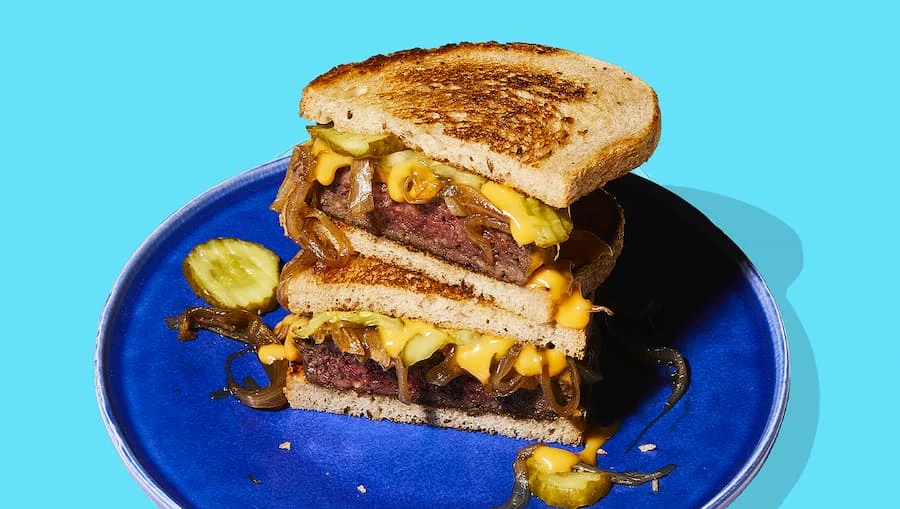
Impossible Burger is made from plants for people who love meat. You can use it just like you would use ground beef in any recipe - from tacos to chili, sliders, lasagna, salads and, of course, burgers. It cooks like beef, tastes like beef, and is much better for the planet(opens in a new tab) than beef from cows.
A 4 oz serving of Impossible Burger contains:
19g of protein, thanks to ingredients like protein-rich soy
3g of dietary fiber, owing to the natural fiber content of many of our plant-based ingredients
Vitamins and minerals such as iron, zinc, calcium, niacin, vitamin B12 and thiamine - some of which are naturally occurring in our plant-based ingredients. Others are added to make sure you don’t miss out on these important nutrients when you replace animal meat with Impossible Burger!
14g total fat and 8g saturated fat, from coconut and sunflower oils
No animal hormones or antibiotics
IMPOSSIBLE BURGER VS. GROUND BEEF
When compared to a 4 oz serving of 80/20 ground beef, Impossible Burger has:
The same amount of protein
Fiber - unlike meat from animals which contain no fiber, Impossible Burger is a source of dietary fiber
Equivalent or greater amounts of many micronutrients, including 8X more calcium (170mg vs 20mg in 80/20 beef)
14 g total fat and 9 g saturated fat (compared to 23 g of fat and 9 g of saturated fat for 80/20 beef)
0mg cholesterol (compared to 80mg for 80/20 beef)
One serving of Impossible Burger contains 370 mg sodium, which is more than a serving of unseasoned ground beef. But keep in mind that ground beef is almost always cooked and eaten with seasonings like salt added to it! It’s important to focus on the sodium content of your entire meal and overall dietary pattern, rather than just one component of it.
WHAT’S IN IMPOSSIBLE SAUSAGE MADE FROM PLANTS?
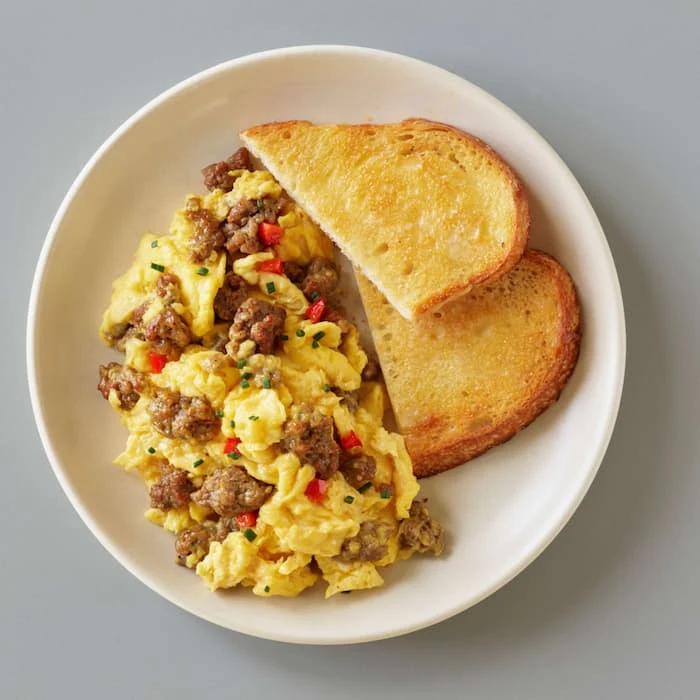
Impossible Sausage (opens in a new tab)is made from plants for people who love the savory taste of sausage. You can use it in breakfast burritos, casseroles, sandwiches, or even crumble it on top of pizza. It’s also perfect as a side next to your favorite pancakes or French toast. And to make it even better, we’ve given you two choices: Savory and Spicy!
Each 2oz serving of Impossible Sausage contains:
7 g protein, mostly from soy protein
1g dietary fiber, naturally occurring in many of our plant-based ingredients
Vitamins and essential minerals such as zinc, vitamin B12, and niacin
9g total fat and 4 g sat fat from coconut and sunflower oils
No animal hormones or antibiotics
IMPOSSIBLE SAUSAGE VS. GROUND PORK SAUSAGE
When compared to a 2 oz serving of the leading pork ground sausage,* Impossible Sausage has:
An equivalent amount of protein
Equivalent or greater amounts of many micronutrients
47% less total fat when cooked and 42% less saturated fat when cooked
0mg cholesterol (4g of sat fat per serving)
A similar or lower amount of sodium
*The leading regular seasoning pork sausage contains 19g total fat and 7g saturated fat per 2oz (56g) cooked serving while Impossible Sausage contains 10g total fat and 4g saturated fat per 2oz (56g) cooked serving.
WHAT’S IN IMPOSSIBLE CHICKEN NUGGETS MADE FROM PLANTS?
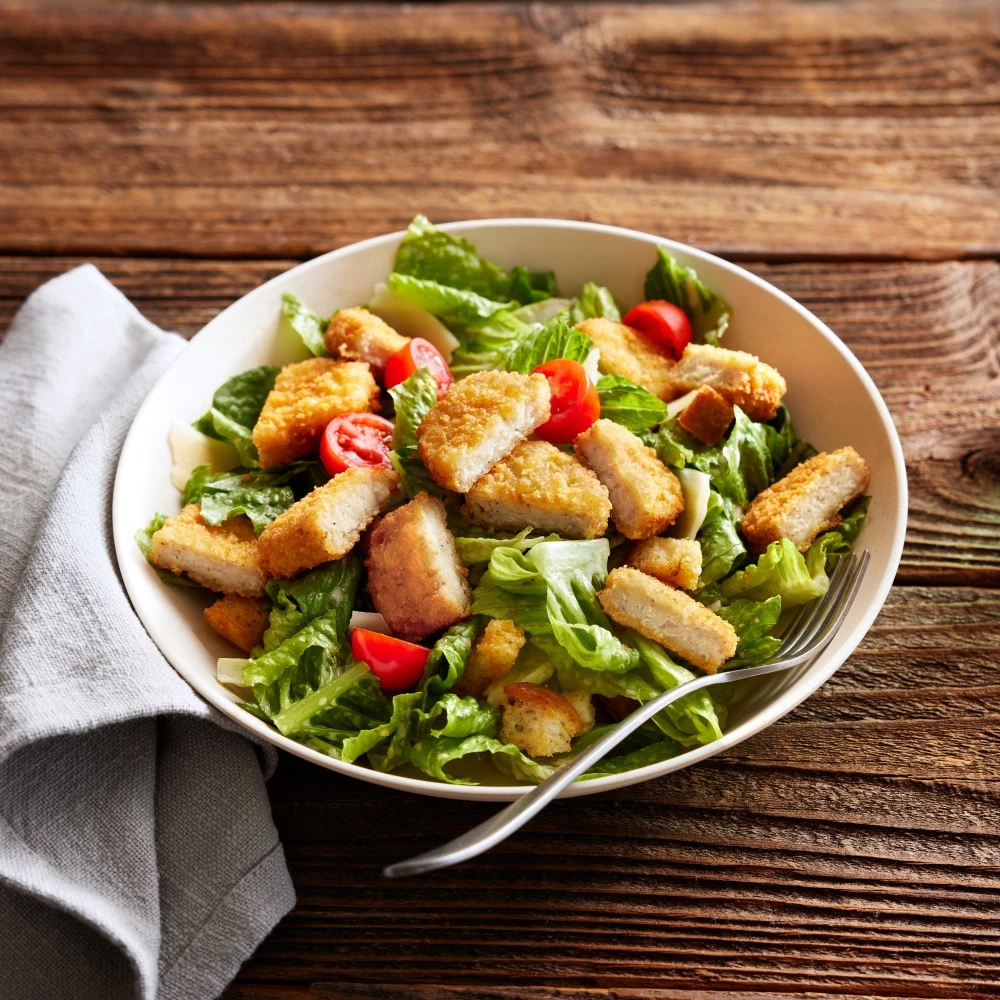
With light, crispy, golden brown breading on the outside and a flavorful and juicy bite on the inside, Impossible Chicken Nuggets(opens in a new tab) prove that the best nuggets no longer come from chicken—they come from plants. Whether you’re popping them in the microwave, oven, or air fryer, you’ll always get a delicious and familiar comfort food that hits the spot and is much better for the planet than its chicken counterparts.
Each 95g (5 nugget) serving of Impossible Chicken Nuggets contains:
13g of protein, primarily from soy protein
2g dietary fiber, coming naturally from many of our plant-based ingredients
Vitamins and minerals such as thiamin, zinc, vitamin B12, and niacin
12g total fat and 1.5g saturated fat, primarily from sunflower oil
No animal hormones or antibiotics*
*Federal regulations prohibit the use of hormones in poultry
IMPOSSIBLE CHICKEN NUGGETS VS. ANIMAL CHICKEN NUGGETS
When compared to a 95g serving of the leading animal chicken nuggets,* Impossible Chicken Nuggets have:
60% less saturated fat and 30% less total fat
0mg cholesterol
Equivalent or greater amounts of many micronutrients
13g protein (compared with 15g protein)
A similar amount of sodium
*The leading chicken nuggets contain 18g of total fat and 4g of saturated fat while Impossible Chicken Nuggets Made From Plants contain 12g of total fat and 1.5g of saturated fat per 95g.
WHAT’S IN IMPOSSIBLE PORK MADE FROM PLANTS?
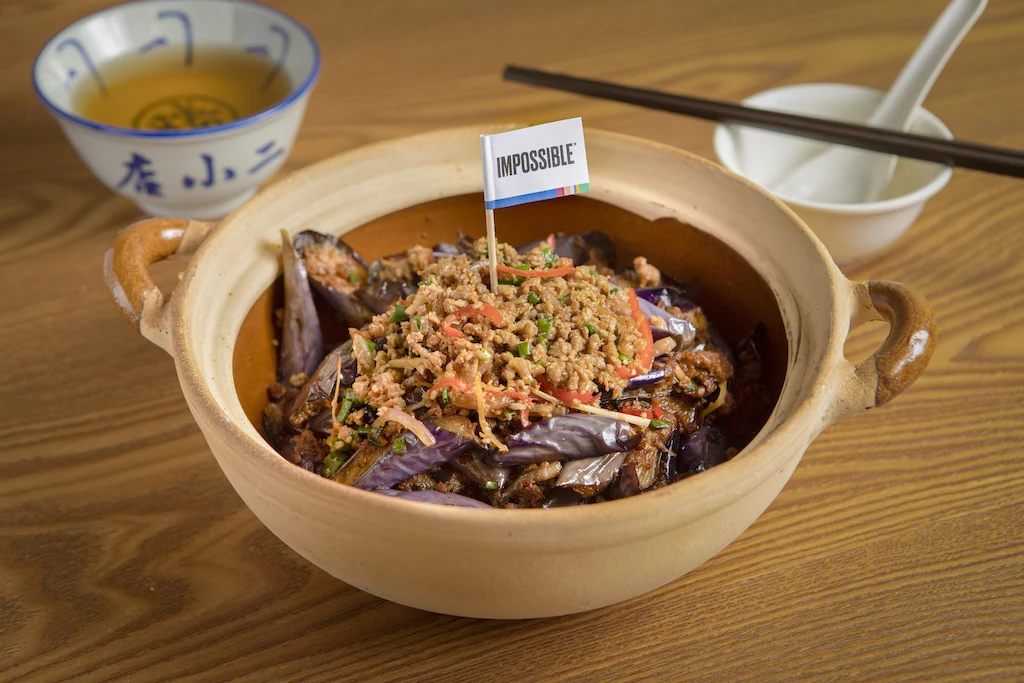
Do you love the juicy, savory taste of ground pork? We’ve got good news for you: Now you can enjoy pork that is made from plants and is much better for the planet. Although Impossible Pork is currently only available in restaurants currently, you can use our handy search to find a restaurant serving it near you(opens in a new tab).
Each 4oz serving of Impossible Pork contains:
18g of protein, primarily from soy protein
4g dietary fiber, naturally occurring in many of our plant-based ingredients
Vitamins and minerals such as zinc, vitamin B12, and niacin
13g total fat and 7g saturated fat, from coconut and sunflower oils
No animal hormones or antibiotics
IMPOSSIBLE PORK VS. GROUND PORK FROM PIGS
When compared to a 4 oz serving of USDA 70/30 ground pork,* Impossible Pork contains:
A similar amount of protein (18g vs 17g in 70/30 ground pork)
Fiber - unlike meat from animals, Impossible Pork is a source of dietary fiber (13g total fat)
Equivalent or greater amounts of many micronutrients
59% less total fat
0mg cholesterol (7g saturated fat)
One serving of Impossible Pork contains 290 mg sodium, which is more than a serving of unseasoned ground pork. But keep in mind that ground pork is almost always cooked and eaten with seasonings like salt added to it! It’s important to focus on the sodium content of your entire meal and overall dietary pattern, rather than just one component of it.
You may also be wondering is Impossible Pork halal? Impossible Pork isn’t certified Halal (good news, Impossible Burger and Impossible Sausage are!), but it is made from plants and contains no animal ingredients or antibiotics.
*USDA 70/30 Ground Pork contains 17 grams of protein, 350 calories, 32 g of total fat, 11 g of saturated fat, and 85 mg of cholesterol while Impossible Pork contains 18 grams of protein, 220 calories, 13 g of total fat, 7 g of saturated fat, and 0 mg of cholesterol per 4 oz serving.
WHAT’S IN IMPOSSIBLE MEATBALLS MADE FROM PLANTS?

Who doesn’t love quick, easy and delicious meals? We all do! Luckily for you, Impossible Meatballs Made From Plants(opens in a new tab) go from fridge to plate in under 5 minutes and take the extra work out of cooking. You can cook them straight from frozen by heating them directly in the oven or microwave, or simply toss them in your sauce of choice while it simmers. Spaghetti with meatballs, meatball subs, Swedish style—it’s all up to you.
Each 85g serving of Impossible Meatballs contains:
12g of protein from soy and potato protein
2g of dietary fiber, naturally occurring in many of our plant-based ingredients
Vitamins and minerals such as folate, vitamin B12, and thiamin
12g total fat and 3.5g sat fat, from coconut and sunflower oils
0mg cholesterol (3.5g saturated fat)
No animal hormones or antibiotics
IMPOSSIBLE MEATBALLS VS. ANIMAL MEATBALLS
When compared to the leading animal meatballs,* Impossible Meatballs have:
A similar amount of protein
Similar amounts of dietary fiber
Equivalent or greater amounts of many micronutrients
30% less sodium*
*The leading homestyle animal meatballs contain 590mg sodium while Impossible Meatballs contain 400mg sodium per serving
WHY DO IMPOSSIBLE PRODUCTS CONTAIN SOY?
Soy is used in countless products in the food industry, and for good reason. We use soy in Impossible products because it is the only widely-consumed plant protein with comparable quality to animal protein. Not only that, it also serves as a good source of fiber and essential nutrients like copper, folate, iron, magnesium, manganese, molybdenum, and potassium. The soy protein we use in Impossible products is sourced from American farms.
Scientific consensus has long supported the health benefits of soy, but concerns about its safety still seem to linger in some corners—none of which have any factual basis. Click here to learn more about why we use soy in Impossible products(opens in a new tab).
DOES IMPOSSIBLE FOODS USE GMOS?
At Impossible Foods, our primary mission is to avert catastrophic climate change and irreversible damage to biodiversity by transforming our global food system. Using protein from genetically engineered soy that has been approved by the FDA, USDA, and EPA is a big part of what makes this mission even possible.
In fact, genetic modification is nothing new. It has existed for thousands of years, dating all the way back to the ancient farmers who bolstered crops via techniques like artificial selection and selective breeding. This idea has carried over to modern times, where advanced technology now gives food suppliers a way to insert specific beneficial genes to create foods resistant to threats like drought, diseases, pesticides, and the pests themselves.
Common foods like rice(opens in a new tab), cornstarch, canola oil, and granulated sugar often come from GMO crops(opens in a new tab), as do some fresh fruits and vegetables like potatoes, summer squash, and apples.
Learn more about why we use genetically modified soy in our plant-based meats.(opens in a new tab)
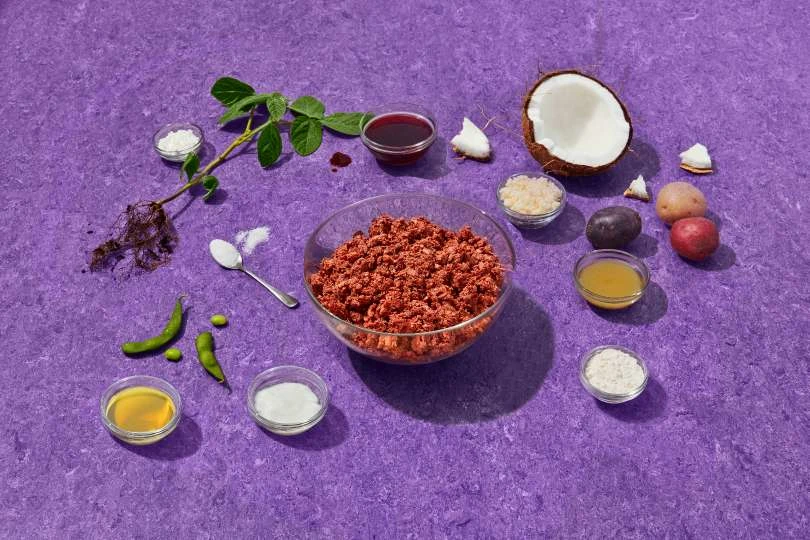
ARE IMPOSSIBLE PRODUCTS PROCESSED?
Yes. And truthfully, most things we eat are prepared through a “process,” i.e., a combination of nature and science, including many ‘‘simple’ or ‘healthy’ foods such as bread, applesauce, and yogurt(opens in a new tab). The negative connotation behind the term “processed” mainly comes from the mass-produced foods that have been prepared in a way to satisfy cravings as cheaply and profitably as possible—frequently at the expense of health and nutrition.
Impossible products are produced by combining carefully selected ingredients derived from plants, vitamins, and minerals, or by fermentation, to create something we think is extraordinary.
We strive to make evidence-based choices to create meat that is not only exponentially better for the health of the planet but also benefits the health of consumers.
THE BOTTOM LINE
At Impossible Foods, we simply want people to eat less meat from animals. Are our products comparable (or higher) in protein than the animal products they replace? Yes. Are they often lower in things like cholesterol and fat? Again, yes. But remember: we are not in this to create “healthy” food. We are trying to save the planet(opens in a new tab).
That’s why we are always working to create uncompromisingly delicious, nutritious and safe products for all people: whether you’re a vegan, a flexitarian, a meat lover, or anything in between.